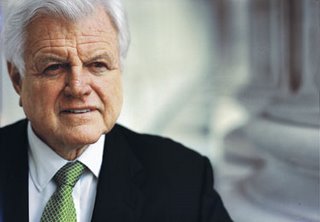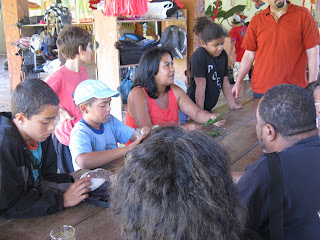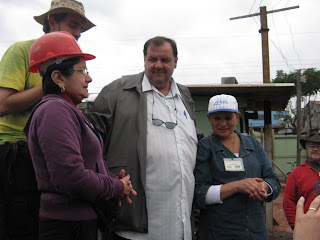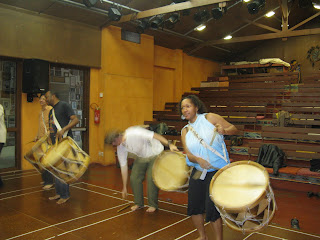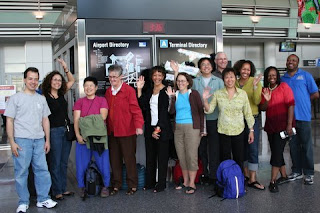I hope that by this point I have shared enough of the positives of Brazil that I can offer some critique in an effort to tell the whole truth. My time in Brazil has made me feel connected to this country in a way that I have never felt before and I am already trying to figure out how I can come back here; however, last night I was reminded that there is a struggle going on here and it cannot be ignored.
Last night I was observing the 7pm DJ class at CUFA (Central Única das Favelas). This organization which I will blog about in detail later has transformed the space under a highway overpass into a youth center and they offer classes in everything from basketball to arts & crafts. On Monday I participated in the graffiti class so Tuesday was the DJ class. The day’s lesson was on mixing and the students were using old US disco tunes and learning how to match up the beats so that one song could be played at the same time as the other.
Somewhere in the middle of an Angelina disco tune I heard what sounded like gunshots but neither I nor anyone else reacted and we just kept spinning. About 30 min later I left the class to connect with the CUFA staff person who has been taking me around. She told me that there were indeed shots fired and she asked me to walk to the train quickly and to be careful. I told her not to worry and that I was used to this in my own neighborhood.
On my walk to the train I passed two people sleeping underneath the overpass trying to find shelter from the rain. In one case I would barely have known that the person was there was it not for one small dirty foot protruding from a misshapen cardboard box. I walked past the box and headed to the train platform.
As I waited on the train platform I was careful to herd with other people. When my train came I got on a car that was supposedly designated for women. I wasn’t quite sure why that was necessary, but as I got on I saw that I was one of three women on a care that had 11 or so men. As I looked down the corridor to the train car on the left and on the right I realized that there were very few women riding the train at this hour. I focused on reading my book making sure that no one would notice that it was in English and I was constantly looking out for the movements of the other women. It was one of those moments where I remembered that no matter how liberated I feel I am still a woman living in a man’s world and the threat of physical and sexual violence becomes real when you are by yourself after the sun goes down.
As I thought about this for myself I was also questioning the sexuality of one of the other women on the train. As I saw her more closely I became pretty sure that she was a woman, but I wondered what challenges she might have looking a little androgynous. It reminded me of an earlier conversation I had with another staff person at CUFA who is doing work around GLBT issues in Rio. In previous conversations with Americans he had been very impressed by the progress we have made in terms of civil rights for gay people. He said that while we are struggling over issues like gay marriage, folks in Brazil are working to get support for young people whose parents kick them out of the house for being gay. While I assured him that we are a long way from being a tolerant society, from his description it seemed like the US had made significant progress in comparison to Brazil. I told him that I felt like Matthew Shepard’s death had had a profound impact on our country in a way that got some people to think differently. On the other hand the young man who was killed this June after the Gay Pride parade in Sao Paulo did not seem to have the same effect on Brazilians.
While we talked in depth about this problem we came to a point where he offered a simple and astute assessment of the problem – Brazilians have come to think that violence is normal and we can’t make change until people realize that violence is not okay.
Until gunshots at 7:30pm are considered a cause for concern and not an every day rush hour occurrence…………………..
Until sunglasses and concealing makeup are not considered essential accessories for a woman in love…………………….
Until cardboard boxes are only acceptable containers for shipping things and not for housing people…………………….
Until a woman can walk at night not concerned that her cries of rape will be ignored by people who “don’t want to get involved”…………………..
Until young gay people are not muzzled into silence because coming out is a death sentence……………………..
Until every child knows what it is to be smothered with hugs and not lashed with belts or clinched fists………………..
Beyond government slogans and campaigns we saw a deep need for more voices to be raised against violence – and I think it is essential that we begin to create space for people to imagine and practice what it means to live with each other in peace. People need to not only hear that violence is wrong but they need spaces where the central paradigm comes from a place of love. Spaces where people hold you accountable not because they are angry but because they want to see you rise to the fullness of your capacity. Places where hugs and affirmations are more common then critiques and slaps.
On Monday night I watched the film Quilombo. It tells the history of Africans who ran away from slavery and created their own communities in the mountains of Brazil. They were willing to fight and die to preserve these places because they were places where they did not have to be subject to the violence of slavery. In our organizations and churches, we must have the same mentality. Our spaces must be refuges from the culture of violence where people learn a new way and are free to live peacefully. Churches need to champion marriage without turning a blind eye to domestic violence. Hip hop needs to create a place for Black men to feel important without being violent towards women. Community associations need to work to clean up their neighborhoods without sanctioning police violence against people who live on the streets. In each realm of life we have a responsibility to work against violence.
While I have seen this struggle in a more pronounced way in Brazil this is truly a global struggle for all around the globe there are women and children who are walking on egg shells in hopes “not to upset daddy” – there are young people using weapons to take each other’s lives – there are people suffering under the violent weight of hunger. This has been part of human culture for thousands of but it is not okay and we must live our lives everyday in a quest for peace.
Please feel free to share your own reflections. This blog is meant to be a dialogue.
